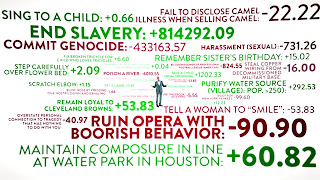The point system
- Remembering your sister’s birthday gets you 15.02 points towards entry into the Good Place?
- Ruining an opera could make you lose 90.9 points?
- Genocide costs 433163.57 points, but ending slavery gains you 814292.09 points?
- Selling a camel without disclosing its illness costs 22.22 points?
(Episode 1, Season 1).
The premise of The Good Place is that people’s place in heaven is earned: their good and bad deeds over a lifetime are painstakingly weighed up (by immortal accountants), and a high enough total gains them a pass mark.
This idea has a few different consequences:
☛ People who are aware of (or suspect the existence of) the point system can get stressed about missing out by a few points; if they do something wrong, particularly just before they die, it might be enough to tip the balance and forbid them entry to the Good Place. Having your eternal fate depend on how good you are at “being good” is very anxiety inducing. (This doesn’t happen so much in season 3 when the group believe their fates are sealed, but does in earlier seasons).
☛ It causes people to stress about the motivations for their actions. Simply having knowledge of the point system can cancel out good actions, since the motivation then becomes self interest rather than genuinely caring about other people. Being rated on the purity of your motivation causes an inward focus, which undermines the whole idea of looking outwards toward others.
☛ A point system also results in a hierarchy. You get to look down on people who are worse than you, compete with those on the same level and feel like trash compared to someone much higher up the scale. Even the phrase “better person” implies that someone with more points has more intrinsic value and worth than those with fewer points.
(In The Good Place, looking down on people is actually presented as a bad thing that loses you points. But in practice a moral hierarchy causes these kinds of problems).
So how does all this work in Christianity? The impression people can have is that it is based on a point system too, or at least on people’s level of goodness or badness. After all, God seems to be all about being good: the Ten Commandments, the Golden Rule to treat others the way you would want to be treated and so on.
Which misses the point entirely. The central message of Christianity is that Jesus died to save us. We don’t contribute a thing towards that; it’s a free gift, unearned and undeserved. God’s standard is not just high, it is actually perfection. The only person who ever lived that way is Jesus. A Christian is someone who depends on what Jesus did rather than what they do to be accepted by God. And God treats them as being just as perfect as Jesus.
In terms of points, the pass mark is ten trillion; God offers ten trillion points to anyone who wants it; and good actions are worth 0.00 points.
Depending on how your take it, this is either a huge relief or a blow to your pride. If you can’t do a thing to save yourself and it’s all been done for you already, that’s great news. But if your identity is that you are a good person who has therefore earned your way into heaven, then being told that your goodness has actually earned you nothing can be pretty offensive. So the choice is to remain offended and keep working hard to attain a goodness you can boast about (which isn’t very pretty by the way – self righteousness stinks), or to let go of your pride and let God carry you instead, and have a rest from all that work.
The idea of God giving us everything for free is called grace. In contrast to the point system, here are some consequences of being “under grace”:
☛ You can relax (everything is fine!). You’ve already made it. Even if you sinned just before you died without a chance to resolve it, God will never abandon or reject you. The promise of the New Covenant is, “I will remember their sins no more.” The death of Jesus took care of your past, present and future sins once and for all, and there is nothing left to do.
☛ There is no need for convoluted introspection about your own motives. God is certainly concerned about what goes on inside, love being genuine and from the heart and so on. But that’s his area: the Holy Spirit is an expert at revealing what we need to see, when we need to see it. We don’t need to go digging all the time.
☛ There is no hierarchy in Christianity; everyone is on the same level, equally in need of saving and equally valuable and loved. Being 100% accepted by God means there is nothing left to prove. As well as being accepted just as you are, you are also being transformed to be more like Jesus, but it becomes really obvious that it is all God’s grace and not something to boast about – just a gift from a God who is freeing and restoring you to be all you were created to be.
But if that’s not really your thing, you can always go back to stepping carefully over flowerbeds for 2.09 points.
Next: Change ... and Chidi and Tahani have a problem.


Comments
Post a Comment